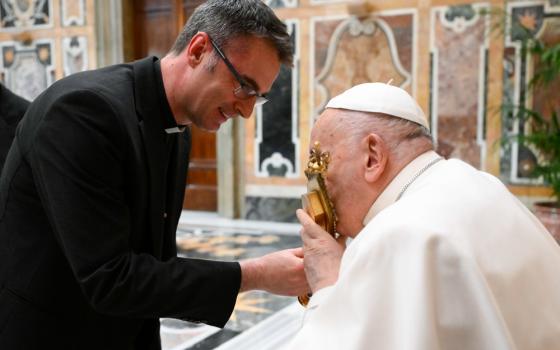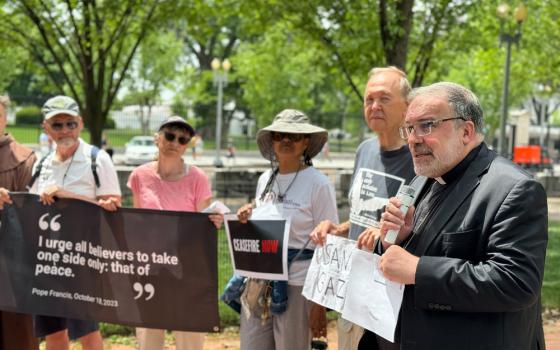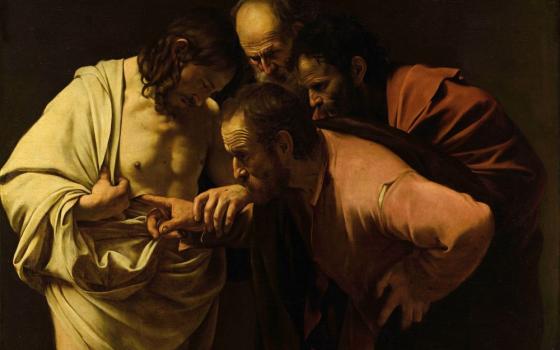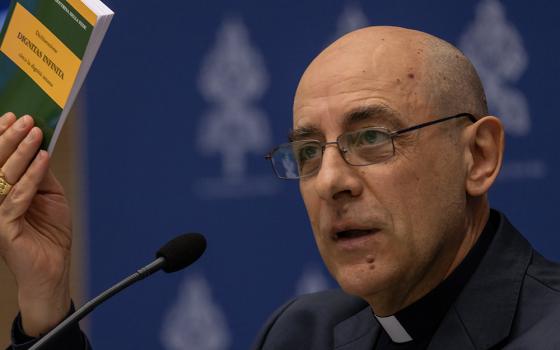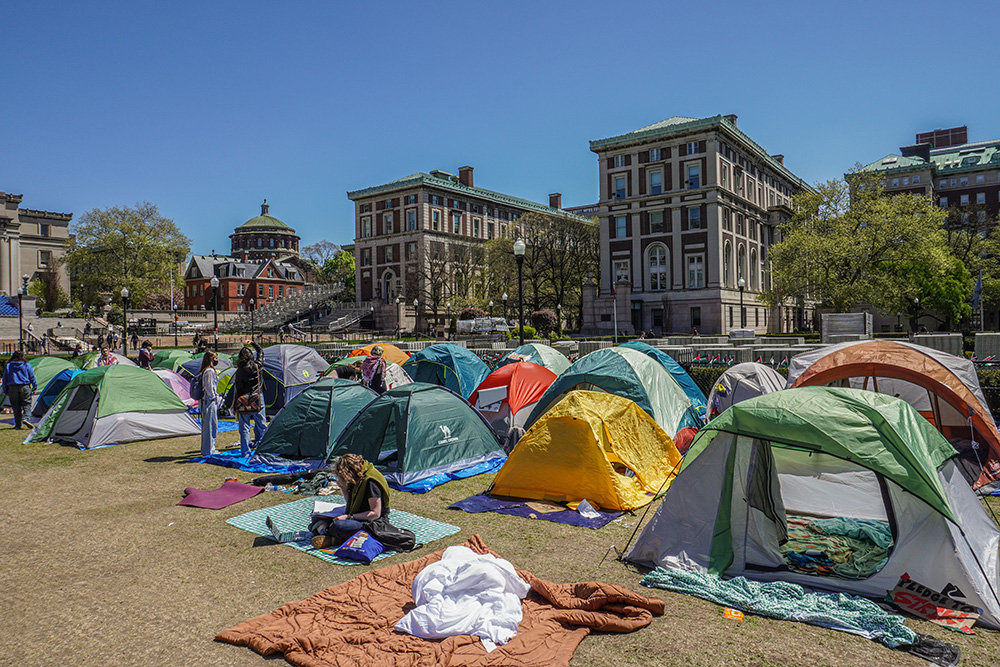
Columbia University students are seen in the pro-Palestinian encampment in the Morningside Heights campus in New York City on April 26. (NCR photo/Camillo Barone)
"Demilitarize Education," reads a large banner at the entrance to the encampment at the heart of the Columbia University campus in New York City, where for the past two weeks more than 200 students have pitched nearly 50 tents, creating a small village.
With food and drink donations coming in from all over the city, historical and cultural debates on the Israeli-Gaza war, music, dance, a tent used for prayer and one as the first aid center, the pro-Palestinian students do not intend to de-occupy the campus until their demands are met by President Minouche Shafik. According to the encampment organizers, they want the university to divest all finances "from corporations that profit from Israeli apartheid, genocide, and occupation in Palestine," transparency about Columbia's financial investments, and amnesty for pro-Palestinian students and faculty who have been allegedly disciplined or fired.
The situation took a dramatic turn on April 18 when more than 108 pro-Palestinian protesters were arrested by New York City police at the behest of Shafik for allegedly violating the university's demonstration policies. After that episode, the number of students in the encampment increased, Columbia went into lockdown, and other non-student protesters joined the protests outside Columbia's gates.
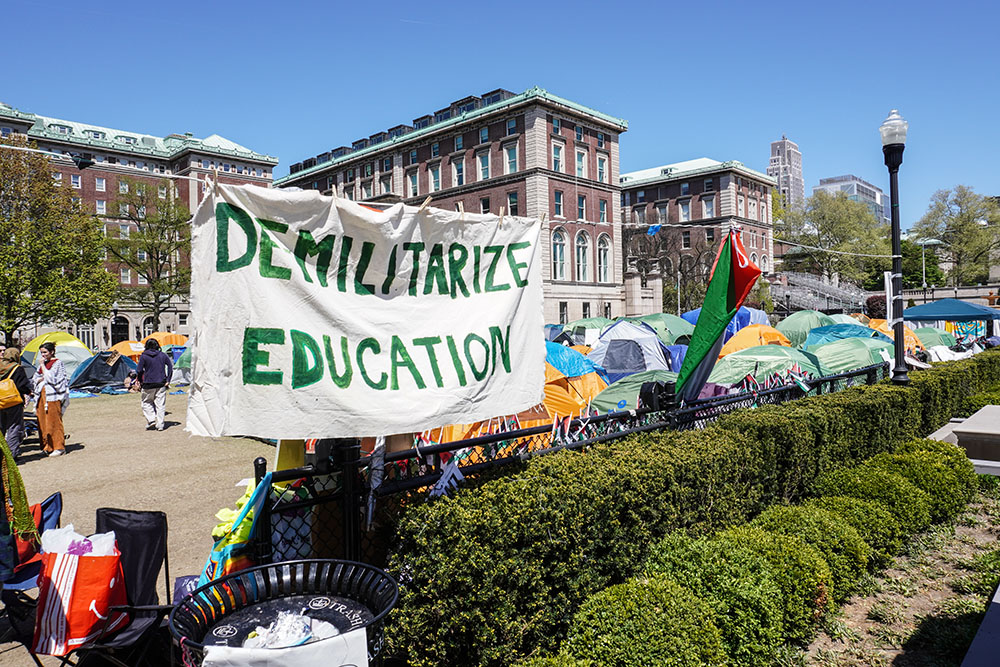
The entrance to the pro-Palestinian encampment in the heart of the Columbia University Morningside Heights campus in New York City on April 26 (NCR photo/Camillo Barone)
"I was not personally on campus when the NYPD arrests happened, but I was watching 114th Street from my dorm and hearing the live coverage [on the radio]," said a 20-year-old Columbia College Catholic student who asked for anonymity in fear of reprisal from the administration. "Hearing the live coverage and watching live videos from students at the arrests was terrifying."
"More than anything, I felt disbelief. I was angry, sad and frustrated, and none of what I was seeing and hearing felt real," they said.
On April 19, the person decided to join the encampment. "I realized that as a Catholic, I could not stand by," they said.
When rumors were spreading among students on the night of April 23 that Shafik was reportedly about to call the police again for new arrests, new tensions erupted on and off campus. About a thousand Columbia students, faculty and staff living in the Morningside Heights neighborhood flocked to the campus just before midnight to watch students trying to dismantle their tents.
After about half an hour, an email from Shafik warned students that they would have another 48 hours to leave campus. On the same night, new negotiations went on between Columbia University Apartheid Divest, the group organizing the encampment, and the Columbia administration.
Advertisement
As of April 26, about 200 students were still occupying the campus, and in a new April 25 statement Shafik said that "talks have shown progress and are continuing as planned," and that rumors about the police being invited to campus again were "false."
"Most of the Catholic students I see prioritize their studies, work and extracurricular commitments over political activism," Fr. Roger Landry, Columbia's Catholic chaplain, told NCR. "Like most of their peers, they care deeply about the suffering that's taken place in the Holy Land since Oct. 7, but they're upset that the toxic animosities of the 76-year-old conflict between Israel and Palestine has spilled over onto their campus."
"To pray and to love" are the two priorities Landry said he has been giving Columbia Catholic Ministry students over the past months, adding that besides praying the rosary every day and attending Mass, he has urged them to reach out regularly to their Jewish and Palestinian fellow students, to ask "how we can help and make sure they know we have their back."
Landry said he has offered ongoing support to both Rabbi Yonah Hain of Columbia/Barnard Hillel and to Ebad Rahman, the Muslim life coordinator on campus. On the night of April 21, the student leaders of Columbia Catholic Ministry, Landry said, offered "gestures of prayerful solidarity" with their fellow Jewish and Muslim students by giving them plants symbolizing their prayers and support.
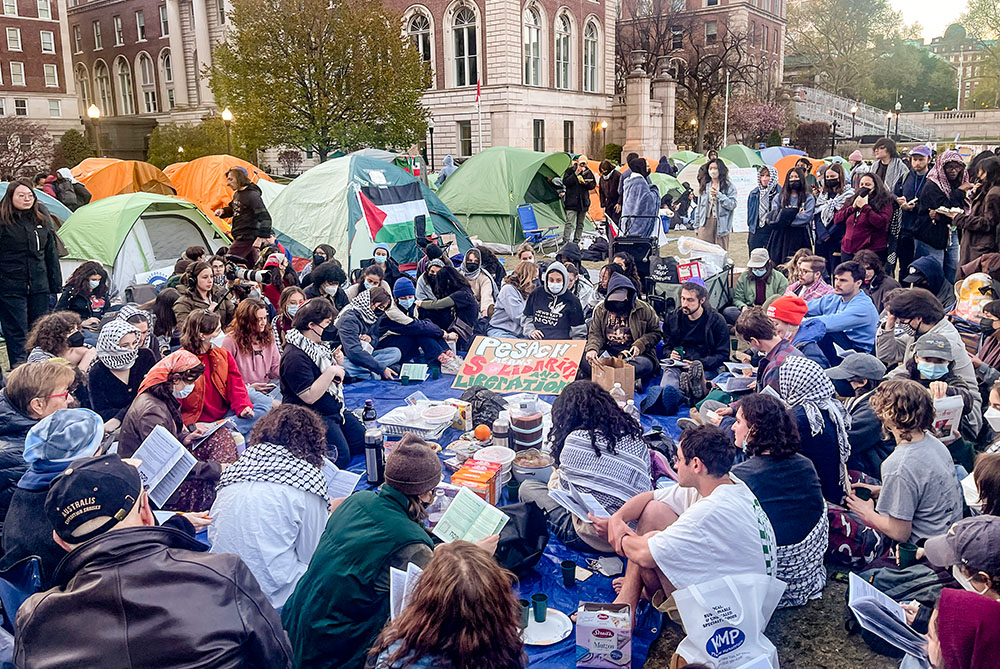
Pro-Palestinian Jewish students celebrate Passover in the “Gaza Solidarity” encampment at Columbia University in New York City on April 22. (NCR photo/Camillo Barone)
Yasmin Leon-Mateo, 21, who serves as a co-president of the Catholic student group at Columbia, told NCR, "As an organization, we don't have an official stance on the protests taking place, except to say we champion all efforts toward peace in the Holy Land and on campus, we oppose everything that spurs division and hostility, and we support what fosters genuine fraternity and mutual respect."
Austin Carr, the group's other co-president, added, "As Catholics and Columbians, we are trying to live by Columbia's motto, 'In Your Light We Will See Light' (Ps 36:10), and bring that light to the present situation of pain and darkness."
As Columbia passed 10 days of campus occupation, both Jewish and Christian pro-Israel protesters also rallied outside the campus' gates, accusing the pro-Palestinian students at the encampment of promoting antisemitism. The catalyst was a viral video capturing pro-Palestinian protesters confronting pro-Israel students with offensive rhetoric.
In the videos, protesters are seen telling pro-Israel students to "go back to Poland" and brandishing a sign referencing them as "Al-Qasam's next targets," a clear allusion to Hamas' military wing. The video quickly spread across social media, igniting outrage and concerns about escalating tensions.
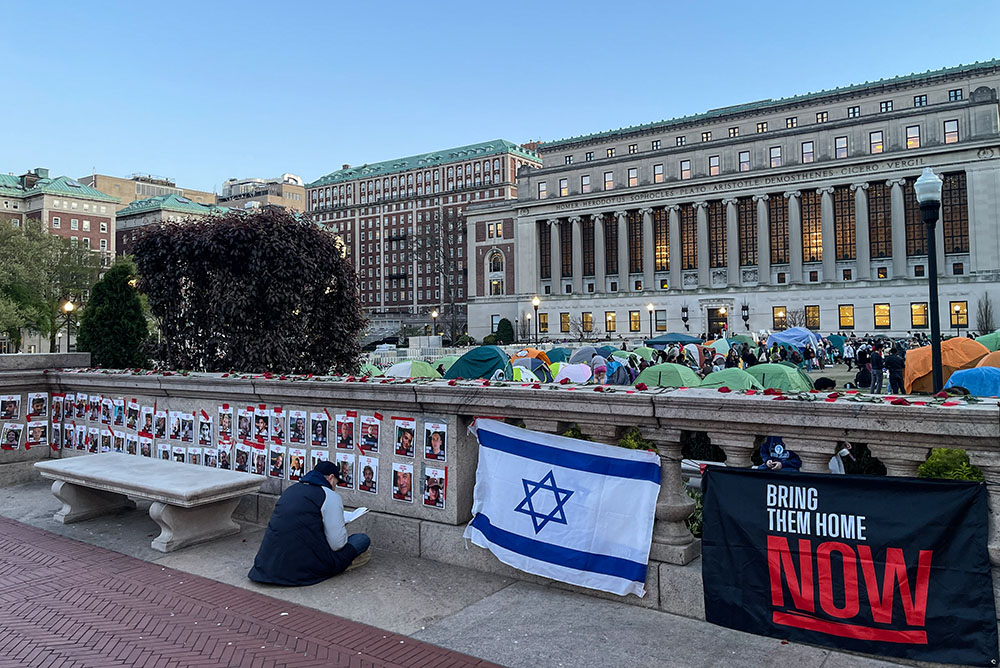
A Jewish student prays in front of pictures of Israeli hostages in Gaza, behind the pro-Palestinian student encampment on the campus of Columbia University in New York City on April 24. (NCR photo/Camillo Barone)
While there are also Jewish anti-Zionist students inside the encampment who celebrated Passover on April 22, accusations of antisemitism were brought against one of the leaders of Columbia University Apartheid Divest, 20-year-old student Khymani James. James was heard saying, "Zionists don't deserve to live" and making a chilling reference: "Be grateful that I'm not just going out and murdering Zionists."
These comments were part of a recording James made in January during and after a disciplinary hearing with university administrators, which he later posted on Instagram. The hearing was centered around an earlier social media post by James discussing fighting against a "Zionist," where he wrote, "I fight to kill."
"What I said was wrong," James subsequently stated. "Every member of our community deserves to feel safe without qualification."
He added, "Those words do not represent [Columbia University Apartheid Divest]. They also do not represent me."
Adding to the turmoil, a screenshot of a message from a Columbia-affiliated rabbi advising Jewish students to consider leaving campus for their safety also went viral, raising alarm about the perceived threat to the Jewish and Israeli community on campus.
"I'm sure the summer will provide a respite for the Columbia administration to review how it's handled the situation over the past year and to clarify what its real priorities are," said Landry.
"It's been gradually moving in the direction of prioritizing the protection of Jewish students on campus from anti-semitic actions and climate, while at the same time still trying to allow student protests, even as those protests have often involved agitators that are making that climate worse," he said. "Such compromises have satisfied none of the parties."








